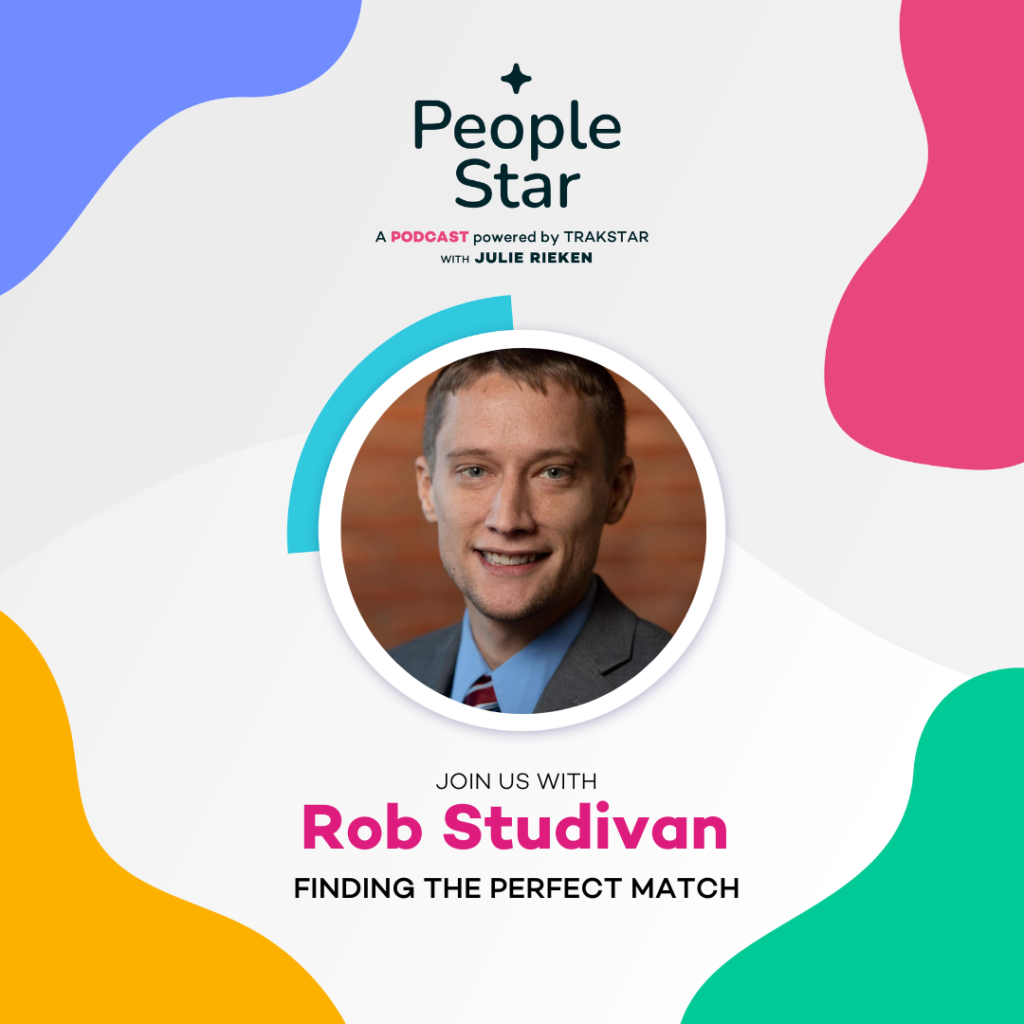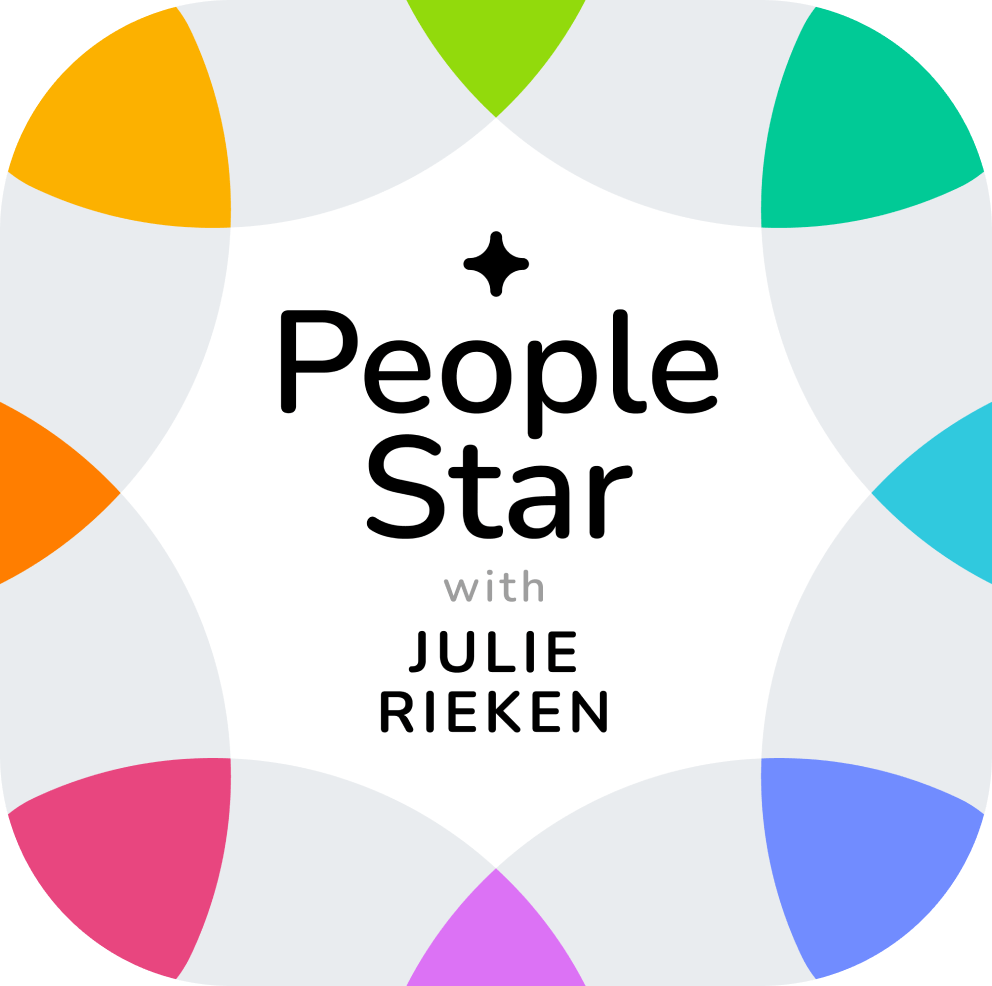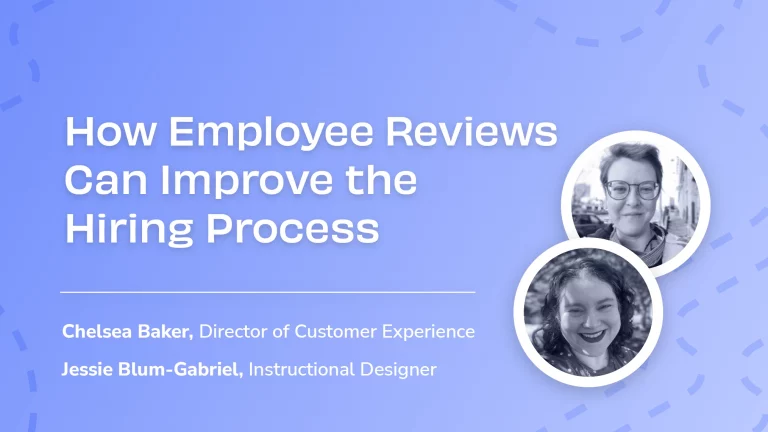PeopleStar – Rob Studivan: this mp3 audio file was automatically transcribed by Sonix with the best speech-to-text algorithms. This transcript may contain errors.
PeopleStar Intro:
Welcome to the PeopleStar Podcast. We deliver leadership perspectives from industry experts on their people, architecture, routines, and culture as they solve HRs newest challenges. And now your host, Julie Rieken.
Julie Rieken:
Good Day podcast listeners! I'm so excited today to have Rob Studivan here with me. He's from eClinicalWorks, and eClinicalWorks is the largest cloud-centric, fully integrated EHR for physicians, population, health, and patient engagement. And Rob, I'm super excited to talk with you today. Thanks for being a guest on the podcast!
Rob Studivan:
Thank you so much, Julie. I'm really excited to be here today to talk about a lot of the things that are going on in today's world and to share a little bit about eClinicalWorks, a little bit about myself, and just some other advice that I can give out to people who are out there listening today.
Julie Rieken:
I love it. So let's just start with this. You are a senior corporate recruiter and we've got today's world! Can you just talk a little bit about, tell me about your world today, and this space, and what's it like?
Rob Studivan:
So I've been in the recruiting space for almost nine years and I've never seen a job market like this one before. Things are moving at a speed that is truly different than any other hiring period that I've ever seen or ever even heard of. And truly, for the first time, I think you're seeing a reckoning across the world where both HR professionals, candidates, and hiring managers are having to take into account all the different perspectives to make sure that they really are finding a good match for themselves, but also for the other people that are involved in that. And they're truly examining things in a way that I think is really important, but also make sure that you truly do find a good match when you're out there job hunting.
Julie Rieken:
Rob, I like the word that you used, it's a reckoning. It is, it's a reckoning, it's really different. You're talking about a trifecta of HR candidates and hiring managers coming together. How do you know when you've found the right match and what are you all doing to attract people in this market? It's not easy.
Rob Studivan:
No, it's definitely the hardest it's ever been. I think candidates are a lot more savvy about what to look for and what to ask for. As tech has continued to grow across the world, especially for the medical industry, which we're in, tech had never been a huge part of that, and it's now starting to become a part of that. So one of the things that we love to share with our candidates that gets them truly excited is we look for people who want to make an impact in health care, who want to take technology and assist doctors, assist patients, assist practices, get better at what they're doing. So I think what's really fun is finding out what a team's passion is and then finding a person whose passion is echoed by that and putting them together and just listening to the conversation. There's so many times now where I'll talk to a candidate after an interview and they're truly excited. They really are excited about what the work that they can be doing in this role. And then the team calls me after and says, Rob, wow, where did you find this person? This is the exact person that I'm looking for. How did you do this? And I think it really comes down to finding out what that passion is behind both sides of that and making that match happen and just letting them take it from there.
Julie Rieken:
That's super interesting. Rob, you mentioned you've been doing this for nine years and there's a reckoning and things are moving at a pace that you've never seen. What have you had to change in your world to match today's, are you doing things differently today than you did two years ago?
Rob Studivan:
Definitely. So previous to the pandemic and this whole world change that we've seen, we had moved pretty well, but we had a lot of teams that took their time. They maybe didn't have as clear of a profile of what they were looking for, didn't have that vision really, truly defined out. So what we started doing was working with them and figuring out, all right, what is it that it takes for someone to be successful on your team? How do you highlight that person who's done a great job? How do you promote them? How do you offer them an opportunity to be on your team for a long time so they feel happy and you have someone who can do the job well, so I think that's been really different. So we've accelerated that process. Our teams have gotten a lot faster at what they're doing, now hiring managers are actually excited to work with us. I think, what was a really big change for us is when I joined eCW almost three years ago, HR had always been that kind of group that sat off somewhere and you only went to them if something was happening or you were in trouble. We changed it to truly a customer service atmosphere, so now I talk to my hiring managers all the time. Even if they're not hiring, I'm in communication with them. So I know, oh, in two months you're going to hire, I should start looking relatively soon, or what can I do to help you plan out your next six months? Whether that involves hiring, or creating a new job in your team, or you have a good picture of the projects that you're working on and being able to put that together in a truly cohesive sense. So that way when you talk to that person that you think might be the right fit, you could tell them about those things, that gets them truly excited, instead of just saying, sure, I could do this job, they say, I have to have that job.
Julie Rieken:
Super interesting. You mentioned something that I think, this, maybe it's just statistical, but I'm interested in it. You are looking for the right match of somebody who has the passion to have an impact in healthcare with technology, and there's the job market. And I would imagine that you've narrowed the funnel a little bit by trying to match that passion with the demand that you might have. And what I mean by narrowing the funnel is it's not easy to find that match. Tell me about volume and speed. Are you seeing more applications, fewer applications? And how are you getting enough people so that you can find that match of the people that share the passion that you have at eCW?
Rob Studivan:
So I think the biggest thing is getting ourselves out there is important. So getting the name recognition, we have a lot of people who use our system across the United States going and keeping our name out there in the public, it's building relationships with colleges and universities, talking to candidates that we end up hiring and saying, do you know someone else that might want to come and work here? Because we would love to have you refer them. And if you make a good referral, we'll pay you a referral bonus, we're happy to do that. So we look for different ways to get our name out there. I think the second piece is making sure that we can truly build a roadmap for where we're going. So it isn't, hey, Julie, I want to hire you and here's what you're going to do. It's I want to hire you, here's what you're going to do, and here's what you could do in the future. So we talk about the things that many of our employees have done. Whenever we create a new position here at eCW and we're looking to hire, we always look internally first. We offer those to our internal employees so they can be the ones to say, oh, you know, I've always wanted to be a business analyst or I've always wanted to go into product engineering. I want to take a leap at that, and it's time for me to apply before we go external. So we have many, many moves across the company on a regular basis and we encourage that to happen. Our team leads, encourage our employees to take that leap, to take that next step and not be afraid to learn something new, do something different. Many of our long term employees had many different jobs across the company and have done a lot of different things. And that also helps with that information sharing as well.
Julie Rieken:
It really does. I just want to give a nod to the idea that you have, that you not only share the position that there, that somebody might be applying for, but what's possible in the future. That idea of career pathing and creating those pathways internally is a massive lift. It's a big job. Do you participate in that?
Rob Studivan:
Yes. So when we talk to our candidates, one of the first questions I almost always amass is where can I grow? So part of that is obviously financial, so we offer good opportunities, come in here, you can get good raises, you can be eligible for our bonus program. But we also talk about other areas that this person could move forward in, other areas that this person could potentially learn in. And talk about how some of our newest product lines only started a couple of years ago, and those teams have been pulling people from other teams inside the company. So we talk about that with them at the onset of the engagement with them all the way through, when they start working for us and then ongoing throughout our check ins with our employee relations team or with their team lead, they talk about that and when their manager feels they're ready, many of our team leads will push someone and give them a little shove and say, Hey, I think it's time. I know you're really happy here, but you would be awesome for this team and I know they're going to start looking, you should apply.
Julie Rieken:
That is a really cool cultural piece. So I've got one final question here and maybe, maybe the thread is, although our listeners can't see you and I can see your enthusiasm for finding these matches and for the kinds of things that you're doing. And so I'm wondering, what kind of advice, do you have a piece of advice that's ringing in your ears right now that you might be willing to share with me or our listeners about things that you've learned?
Rob Studivan:
Absolutely. So I think my number one piece of advice and this is what I tell especially students coming out of college, but I think it really applies to anybody is when you go into an interview, is be who you are and I'll tell a funny story that I think really highlights this. So I had someone who I had met at a career fair at a college who was interviewing for a job with one of our teams, and they sat down with the hiring manager and started answering in these very canned answers, it didn't really give a true picture of what that person was looking to do, or where their skill set was. And when I called them after I said, well, why did you do that? And they said, oh, I was telling the manager what I thought they wanted to hear, and I'm like, well, that's actually not what the manager wants to hear, they want to hear why you want to do this, they want to hear your excitement. So going in there and showcasing that excitement saying, I want to do this because this or I want to do it because of that truly will set you apart versus just coming in and saying, yeah, I can meet the sales numbers and I can make our clients happy. That's not really going to sell you into a position, but if you say, I love talking to physicians and presenting them a solution, that they go, wow, how did I not have this 15 years ago, this could have changed my practice? That's the type of person we want to hire because that excitement will just spread and we all have it here, we all have it in our different areas. Even our owners who started the company 23 years ago are still involved in our business because they get excited about what they do.
Julie Rieken:
I love to hear this. What a phenomenal culture that you all have and I can see your excitement, enthusiasm and your authenticity and encouraging applicants to be the same, that's …
Rob Studivan:
Absolutely. And I think that's so important, is if you go in there and you are yourself, that's going to give a true image of who you are and where you could become and what you could become instead of this image that you think they might want to hear. Oftentimes that's not what they want to hear, they want to meet the true you, they want to meet Julie, they want to meet Rob. They don't want to meet this image that you've created.
Julie Rieken:
So true. Well, listeners, I hope you've gained some really great ideas on recruiting, the pace of recruiting, good advice to give to candidates and, and have learned a little bit from, from Rob's great advice today, I certainly have, and it's been a pleasure. Thank you for being a guest.
Rob Studivan:
Thank you so much, Julie. This was wonderful and thanks everybody for listening. This has been truly an awesome experience to be able to share just a little bit about who we are, what we do, and why I love doing what I do every day.
Julie Rieken:
That's amazing. Continued success to you.
Rob Studivan:
Thank you so much.
PeopleStar Outro:
Thanks for listening to the PeopleStar Podcast. For the show notes, transcript, resources, and more ways to get a seat at the table, visit us at TrakStar.com/Podcast.
Sonix has many features that you’d love including automated subtitles, transcribe multiple languages, powerful integrations and APIs, enterprise-grade admin tools, and easily transcribe your Zoom meetings. Try Sonix for free today.




